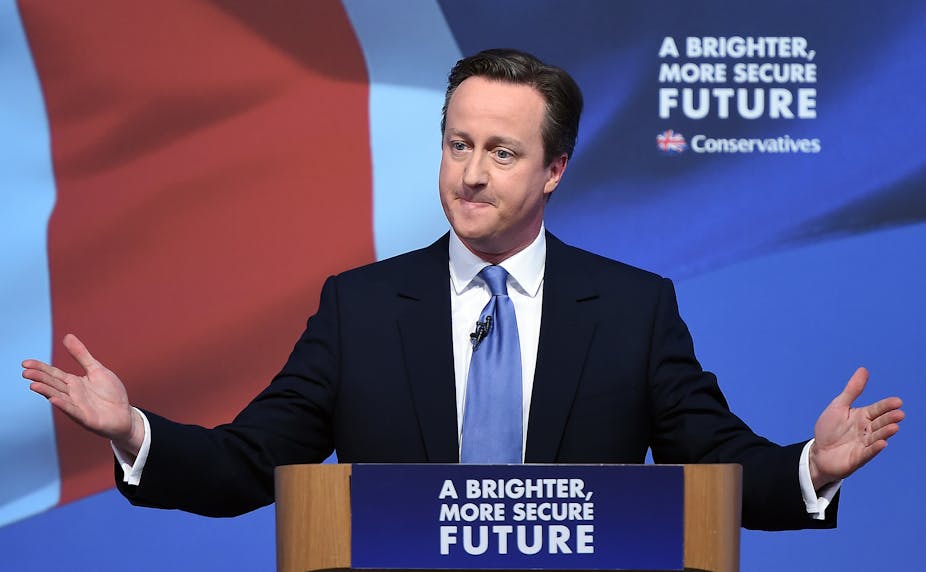Welcome to The Conversation’s Manifesto Check, where academics subject each party’s election manifesto to unbiased, expert scrutiny. Here is what our experts had to say about the Conservatives’ top policies. Follow the links for further analysis.
Economy
William Tayler, Development Lecturer at Lancaster University
The party boasts to have successfully halved the inherited budget deficit and restored confidence in the UK economy. They point to the 1,000 jobs a day being created and forecasts of seeing a fall in debt to GDP this year. While employment levels have shown significant improvement, other measures of economic performance paint a less rosy picture of the state of the UK economy than the party’s opening comments in their manifesto.
For example, the considerably persistent fall in real wages during the last parliament and productivity per hour worked remaining at around 16% lower than pre-crisis levels. Admittedly, a large proportion of these falls are a hangover from the financial crisis and the prolonged recession in the eurozone. But the Office of Budget Responsibility estimate that austerity reduced GDP by 2% between 2011 and 2013.
Read more here.
Iain Clacher, Associate Professor in Accounting and Finance at University of Leeds
With this manifesto, the Conservatives could have set out a clear, honest, economic roadmap. It is disappointing that they haven’t done so. This is probably because many voters would not like the answers, but it leaves the party’s key economic polices looking random, and lacking a coherent strategy.
Ultimately, any government has budget constraints. Therefore, what is spent in one area of government, results in budgetary cuts in another, or in higher taxes. The Conservatives say that they will be able to raise money via a clampdown on tax avoidance and efficiency gains across departments. Sadly, both of these holy grails of government are almost impossible to achieve, and never generate the the revenues governments think they will.
Read more here.
Education
Hilary Steedman, Senior Research Associate at London School of Economics and Political Science
The Conservatives’ manifesto skates over some uncomfortable truths about the development of apprenticeship during their last five years in office. True, as stated in the manifesto, 2.2 million new apprenticeships (apprenticeship starts) were registered between 2009/10 and 2013/14. However, of those starting an apprenticeship in this period, 850,000 were adults aged 25 or over.
In fact, the coalition government presided over and encouraged a huge increase in adult apprenticeships while numbers of 16-18 year olds in apprenticeship barely changed year on year. Most of those on adult apprenticeships were already in employment and a House of Commons Select Committeefound that many adult apprenticeships offered poor value for money. It is, therefore, depressing to see a bland promise of apprenticeship numbers trumpeted in the manifesto -– 3 million over the next five years –- with no preference for young people and no commitment to higher quality.
Read more here.
Sandra McNally, Research Associate at London School of Economics and Political Science
On the curriculum, the Conservatives emphasise learning of the basic skills of literacy and numeracy in primary schools, and in secondary schools (where this fails). They are right to prioritise these areas. Inadequate literacy and numeracy is a problem for about a fifth of the adult population, and those aged 16-24 perform worse than those aged 55-65 (unlike in most other countries). Partly as a result, establishing basic literacy and numeracy leads to a high earnings return in later life.
Whether or not changing the curriculum will actually improve in these basic skills is another matter.
Read more here.
EU relations
Susan Milner, Reader in European Politics at University of Bath
When it comes to Europe, gone are the euphemistic references to “balance of competences” and “renegotiating” European policy. Instead, the Conservative manifesto has returned to the two R’s of the pre-coalition era: referendum, and return of powers. The manifesto reflects the careful line trodden since 2010 by the Conservative leadership, between concessions to the eurosceptic wing of the party, and recognition of the concerns of different sections of business.
The Conservatives want control over two home office policy areas returned to a national level: immigration and human rights. The Tories criticise the Labour Party’s earlier agreement to lift controls on free movement. Yet the manifesto does not explain how controls on immigration can now be secured, which would be a difficult process for any future government.
Read more here.
Health
Andrew Street, Professor at the Centre for Health Economics, University of York
The party claims to have “cleared out bureaucracy” and, indeed, there are 20,000 fewer managers and support staff now than in May 2010. NHS productivity has improved year-on-year, mainly due to slower recruitment of staff. And the manifesto correctly claims that The Commonwealth Fund has ranked the UK as having the best health system among 11 countries.
But other statements don’t stand up to scrutiny. The official statistics contradict claims that fewer patients are waiting longer than target times. In February 2015, 18,804 more patients were waiting longer than 18 weeks – and 6,019 more than 26 weeks – for hospital admission, compared with May 2010. And although 194 fewer patients were waiting more than 52 weeks, many more patients were also waiting longer for outpatient care.
Read more here.
Immigration
Catherine Harris, Research Fellow at University of Sheffield
The Conservatives commitment to controlling immigration has recently been questioned after they failed to meet their net migration target. Now, the party’s election manifesto outlines its immigration policies for the next parliament, and how they would be implemented.
The Conservatives are proposing to keep their “ambition” of delivering annual net migration in the tens of thousands, and to control migration from the European Union by reforming welfare rules. They also claim they will clamp down on illegal immigration and enhance UK border security.
Although the Conservatives talk tough about immigration, with mentions of strengthening borders and improving enforcement, they actually offer few new policies. And those that are new would be ineffective.
Read more here.

